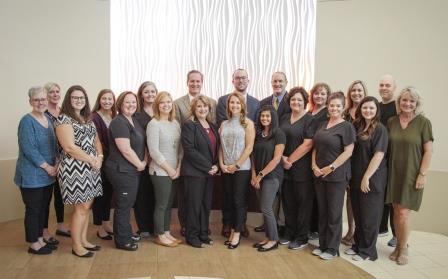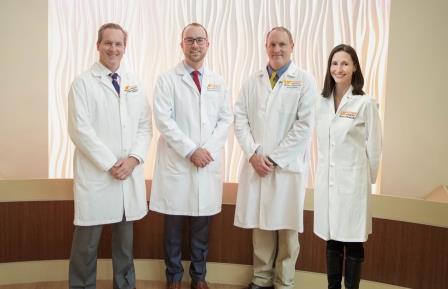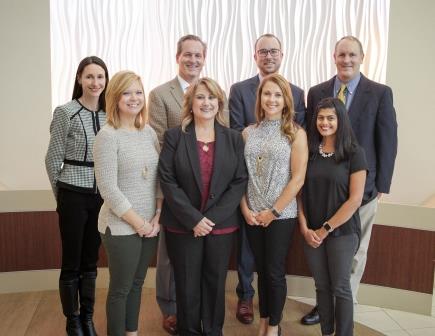University Surgeons Associates
Address
1934 Alcoa Hwy Ste D, #285
Knoxville, TN 37920
Phone
(865) 305-9620
Fax
(865) 525-3460

Address
1934 Alcoa Hwy Ste D, #285
Knoxville, TN 37920
Phone
(865) 305-9620
Fax
(865) 525-3460

The surgeons at University Surgeons Associates are committed to providing minimally invasive solutions to your surgical problems.
We have been leaders in minimally invasive surgery in East Tennessee for decades. The first laparoscopic gall bladder surgery in the area was done by our surgeons. Since then the laparoscopic surgeries for gastroesophageal reflux, hernias, solid organ removal and now bariatric procedures have been introduced and are common place. The physicians of University Surgeons Associates have sponsored and directed courses for practicing surgeons in:
WHAT ARE THE ADVANTAGES OF LAPAROSCOPIC SURGERY?
In the past, making incisions in the abdomen, flank, or back was necessary for open surgical procedures. Today, with the technique known as minimally invasive surgery, many previously open surgical procedures can be performed laparoscopically through small 1/4-1/2 inch incisions or now even through a single incision site. Patients may leave the hospital sooner and return to work more quickly than patients recovering from open surgery.
Results of surgery may vary depending on the type of procedure and the patients’ overall condition. Common advantages are:
IS MINIMALLY INVASIVE SURGERY RIGHT FOR YOU?
Although minimally invasive surgery has many benefits, it may not be appropriate for some patients. Obtain a thorough medical evaluation by one of our surgeons and in consultation with your primary care physician find out if the technique is appropriate for you.
Da Vinci® robotic assisted surgery is a new technique that allows for more precision in minimally invasive procedures. Regular minimally invasive procedures are done laparoscopically, where a surgeon makes one or a few small incisions and inserts miniature instruments as well as a video camera through the incisions. The camera will transmit an image of the internal organs, and the surgeon will use the images to perform the surgery manually. With Da Vinci® robotic assisted surgery, a surgeon will sit at a console in the operating room and use controls to move tiny instruments attached to robotic arms. A camera is inserted at the sight of the incision and transmits a 3D image of the site. The surgeon operates based on the 3D imagery, and the robot translates the surgeon's movements with exact precision. The robot has extensive checks so that it is completely unable to be programmed to perform a certain task or operate in any way on its own. Robotic assisted surgical technology allows surgeons to perform increasingly advanced procedures in a minimally invasive fashion. Without this technology, most advanced operations are often done open, which results in more scarring, a longer hospital stay, increased risk of infection, and a longer recovery for the patient. As this technology improves it enables more efficiency in the medical field, and benefits both the patients and their providers.
The breast surgeons at University Surgeons Associates provide surgical expertise to women with breast problems, including breast cancer. They participate weekly in a multidisciplinary breast conference that reviews breast imaging and biopsies with the radiologists and pathologists. In situations when a breast cancer is found, a treatment plan is developed in conjunction with medical and radiation oncologists. This reassures the patient that they are receiving expert advice and opinions that are tailored to their needs. The breast surgeons at University Surgeons Associates have frequent experience with sentinel node biopsy, partial mastectomy and other less invasive techniques to reduce pain and get patients back to their regular activities sooner.
BREAST CANCER SYMPTOMS AND WARNING SIGNS
RISK FACTORS FOR BREAST CANCER
Endocrine Surgery Overview
Our surgeons are experienced in minimally invasive radioguideed parathyroidectomy (MIRP), endoscopic assisted thyroid surgery, intraoperative PTH monitoring and vocal cord nerve monitoring during endocrine surgery. We have expertise in all thyroid diseases including thyroid cancer.
University Surgeons Associates work closely with patients and their endocrinologist to provide the most advantageous care to those with endocrine disorders. With surgeons who specialize in endocrine surgery, we are leaders in implementing the newer technologies in endocrine surgery.
WHAT IS THE ENDOCRINE SYSTEM?
The endocrine system is made up of glands throughout the body that regulate the function, growth and development of almost every cell, tissue and organ in the body. It does this through the secretion of hormones directly into the bloodstream.
The Thyroid gland is a small, butterfly-shaped gland located at the base of your neck which regulates the body’s metabolism. Thyroid dysfunction happens when the thyroid gland produces too much or too little thyroid hormone.
The Parathyroid glands, located behind the thyroid secrete parathyroid hormone. These glands control calcium levels throughout the body.
The Adrenal glands are located above of each kidney. Their functions include: maintaining salt levels in the blood, maintaining blood pressure, controlling kidney function, and controlling fluid concentrations in the body.
If you've struggled with obesity
most of your life...
...you know it is more than just a weight problem. It is a lifestyle problem. It is a self-esteem problem. Above all, it is a major health problem. In fact, clinically severe obesity—at least 100 pounds over ideal body weight—is classified as a serious disease.
University Surgeons Associates works with the The University Bariatric Center at the University of Tennessee Medical Center to provide a comprehensive approach to the bariatric surgery process. Its multidisciplinary team of consultants made up of surgeons, dietitians, exercise specialists and administrative staff will partner with you to provide a weight-loss program that addresses your individual needs and helps you maintain your weight loss.

WHAT MAKES A HERNIA CENTER?
A Hernia Center is a special surgery unit focused on the innovative treatment of the broad spectrum of hernia disease. Most people think of a hernia as a small medical inconvenience, but hernia disease ranges from small and simple to very complex, difficult, and even recurrent. Hernias can happen from physical wear and tear, related to a prior abdominal surgery, and even return after a prior hernia repair. Also there can be life altering complications when a hernia surgery does not go well. Our Hernia Center is designed to provide the most innovative hernia care in the world by focusing on four core principles:
The Hernia Center focuses on solving patient problems from hernia or hernia related complications. We provide unique hernia care services not available elsewhere, that further demonstrate our commitment out patients and community. This includes:


The surgeons at University Surgeons Associates perform surgical procedures through endoscopic and combined laparoendoscopic techniques. This includes removal of tumors, foreign bodies and stones as well as treating sites of bleeding, obstruction and infection. These types of procedures can be the definitive treatment for some patients and therefore avoid a more invasive procedure. For others these procedures may be diagnostic or used in preparation for a later procedure. There are some situations where the patient may be so ill that such surgical interventions may be palliative or used to allow the patient to stabilize or gain strength before undergoing more invasive surgery. University Surgeons Associates are committed to developing and implementing the latest techniques and technologies as they become proven and available.
General Surgery Overview
The surgeons at University Surgeons Associates are all fully trained and board certified by the American Board of Surgery in the management of all aspects of General Surgery. As full time faculty members of the Department of Surgery and Division of General Surgery at the University of Tennessee Medical Center at Knoxville we are constantly enhancing and maintaining our medical knowledge and surgical skills. We are involved daily in teaching students, residents, nurses and practicing physicians the most up to date information and techniques.
The University of Tennessee Medical Center is the regions’ premier medical teaching institution and tertiary referral center and as such treats a wide variety of routine as well as complicated and unusual surgical conditions. It has the largest selection of comprehensive services at any location in the East Tennessee region. There are numerous medical and surgical specialist and subspecialist available to us when needed to help with your care. We have access to research programs that provide our patients with the latest advances in treatments and diagnostics.
The physicians and staff of University Surgeons Associates. are committed to working with all patients, institutions and communities in east Tennessee for the purpose of providing the highest quality surgical care, with the sole intent of improving the health status and well being of all served.
Our surgeons will work with you to diagnose, manage and if necessary operate on your general surgical condition. We will co-ordinate with your primary care professional and specialty consultants in determining the need for and timing of surgical intervention. If your condition requires surgery the following are general guidelines.
WHAT PREPARATION IS REQUIRED?
HOW IS SURGERY PERFORMED?
For elective surgery, you will most likely be asked to check into the hospital the morning of your surgery.
WHAT SHOULD I EXPECT AFTER SURGERY?
Our goal is for your surgery and recovery to be as comfortable and convenient as possible. You may experience temporary pain and swelling at the excision site.
WHAT COMPLICATIONS CAN OCCUR?
Surgery is generally considered extremely safe. The degree of risk is dependant on the procedure and your condition. As with any operation, there is a risk of a complication. Complications during the operation may include:
WHEN TO CALL YOUR DOCTOR
Be sure to call your physician or surgeon if you develop any of the following symptoms after surgery:
Check with your surgeon regarding any special information and/or instructions for your particular procedure and/or conditions.
The Surgical Health Optimization Center was developed to help patients properly prepare for their upcoming surgery. Our goal is to improve each patient’s health in order to decrease their risk of complications during and after surgery. The best results for your surgery may require you to address health issues that increase your risk of complications. Smoking, nutrition, obesity and diabetes are some conditions that increase those risks.
Patients identified as “high risk” based on their underlying physical status and co-existing medical conditions account for more than 30% of ICU admissions, 70% of post-operative deaths and 90% of the care provided during hospitalization. Health optimization prior to surgery has been shown to help reduce hospital length of stay, hospital acquired conditions, and readmission rates; translating into better quality care and higher patient satisfaction.
PATIENT PARTNERSHIP FOR SURGERY
Our health optimization team of Advanced Practice Providers and Health Educators develop a preoperative risk assessment that customizes the care plan for each patient. In some cases, medications may be used to optimize your health and reduce your risk prior to your upcoming surgery. Education and individualized coaching are provided at each visit. Support groups may also be effective to assist you in reaching your health goals.
COMMUNICATION WITH YOUR PHYSICIAN
Your health optimization team will be in communication with your referring physician after each visit. Updates about your progress towards health improvement will he shared and celebrated. The health optimization program will be tailored for your specific surgery, preoperative goals and current health status.
LONG-TERM FOLLOW-UP
We provide long term follow up care for those patients who need continued accountability, lifestyle intervention and behavior modification. We are committed to helping our patients achieve long term success to help prevent future health problems. We may follow our patients for years to ensure adequate support. Each treatment plan is tailored to meet our patients’ unique needs.
Address
1934 Alcoa Hwy Ste D, #285
Knoxville,
TN
37920
Where we are
Building D, Suite 285

University Surgeons Associates
Our surgeons have provided quality surgical care to East Tennessee since 1977.
The physicians are all fulltime faculty members at
The University of Tennessee
We are committed to the highest quality of surgical care, research and education of
students, physicians and the public. We are experts in:
Minimally Invasive Surgery, Breast Surgery, Endocrine Surgery, Weight Loss,
Hernia Surgery, Surgical Endoscopy, Wound Care and General Surgery

